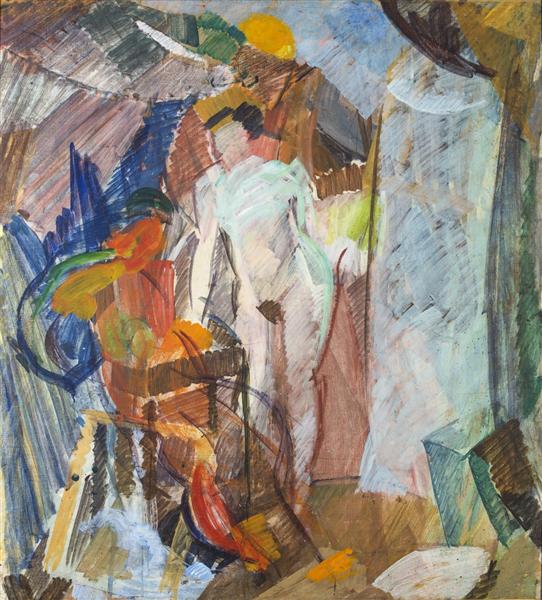Description
The work "Mars and Venus" by Edvard Weie, created in 1923, is a captivating representation that invites contemplation through its unique composition and its visual narrative. In this painting, Weie gives life to two of the most emblematic deities of classical mythology: Mars, the god of war, and Venus, the goddess of love.
The work is characterized by its symmetrical disposition, with a clear separation between the two central characters. Mars, represented in a melancholic tone, occupies the left part of the canvas. His robust and almost imposing figure contrasts with the softness and delicacy of Venus, which is on the right with an expression that mixes serenity and desire. The color palette used by Weie is remarkable: the warm and vibrant tones that give life to the figure of Venus predominate, as opposed to the darkest and cold colors that surround Mars, suggesting an inherent tension between love and war.
The details in the dress of the characters are worth mentioning. Mars is portrayed with an armor that reaffirms its war and virile character, while Venus looks a draped that evokes sensuality and beauty, reinforcing its attributes as a goddess of fertility and love. The way Weie deals with the body of Venus, with soft curves and a posturality that radiates confidence, contrasts with the rigidity of Mars, creating a visual dialogue between the two forces they represent.
A fascinating aspect of this work is the use of space and background. Weie opts for a background reminiscent of more abstract and dreamlike landscapes, resulting in an atmosphere that escapes a strictly naturalistic representation. This approach reinforces the subjective interpretation of the relationship between the two characters, contributing to the work an almost symbolic dimension instead of merely narrative.
Edvard Weie's style, as one of the representatives of the expressionist movement, becomes evident in "Mars and Venus." It is not only a representation of mythological figures, but an exploration of emotions and feelings, of tension and harmony, which transcends the simple allegory. Through his vibrant palette and his style of Brushwork, Weie breaks with the artistic conventions of academism to enter a more personal and subjective interpretation of classic archetypes.
It is worth mentioning that Weie was known for his contribution to Nordic art and his experimentation with shape and color. Although he is not one of the most recognized artists in art history, his work, especially this work, reflects the internal struggle of the human being and the dynamics between opposites, such as love and war, life and death. "Mars and Venus" thus becomes a painting that is visually appreciated, but a vehicle for reflection on the complexity of human relations, which lives in our collective imaginary since time immemorial.
In conclusion, "Mars and Venus" is a work that, through its artistic conception and its chromatic wealth, invites the viewer to reflect on the eternal duality of these two aspects of human nature. Weie's mastery lies in its ability to capture these emotions and conflicts in a way that continues to resonate with us today.
KUADROS ©, a famous paint on your wall.
Hand-made oil painting reproductions, with the quality of professional artists and the distinctive seal of KUADROS ©.
Art reproduction service with satisfaction guarantee. If you are not completely satisfied with the replica of your painting, we refund your money 100%.

